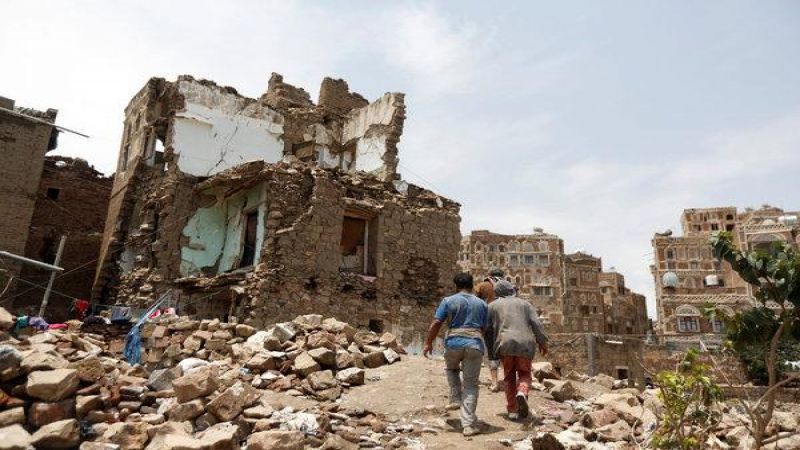
By David Miliband
The promise by Donald Trump to veto the bipartisan Congressional War Powers Resolution on Yemen is significant in and of itself. The decision is rightly drawing significant fire. The war in Yemen is a humanitarian disaster and a strategic failure, with precisely the forces the Administration says it opposes - Iran, jihadists, separatists - gaining ground on the back of the bankrupt Saudi-led war strategy.
However, there is a wider, ugly picture, beyond Yemen. It can be summarized as an Age of Impunity: where war crimes go unpunished and the laws of war become optional. This is not solely the responsibility of the United States, but the US has the power and position to set a global standard, and when it fails to do so the effects are felt worldwide, by innocent civilians feeling the brunt of lawless military tactics and humanitarian aid workers risking life and limb as they go about their work.
Individual cases retain the power to shock. Last week in Yemen, a … Saudi-led coalition airstrike hit a gas station located mere meters from a hospital, killing seven people, including four children and a health worker.
There is a trend, however, going beyond isolated cases and beyond the Trump administration. The overall statistics suggest a terrible new normal: civilians fair game, humanitarians unfortunate collateral, investigations and accountability an optional extra.
Civilians now account for 90% of all war casualties. Attacks on hospitals in Syria have actually increased since 2016 when a UN Security Council resolution called for them to cease. A recent report has revealed that chemical weapons, expressly forbidden by international law, were used over 330 times against civilians over the eight years of the civil war. Last year in Yemen there were nearly 100 civilian casualties per week and Yemenis are more likely to be killed at home than in any other structure.
The latest statistics (from 2017) highlight that more than 300 aid workers were killed, wounded or kidnapped in the line of duty.
The International Rescue Committee and other Ebola treatment centers in the Democratic Republic of Congo have been torched.
IRC-supported hospitals in Syria have been bombed at least 13 times - medical teams no longer operate static facilities.
We know terrorist groups have little interest in international law. But too many governments now believe they have license to behave in rogue fashion as they lack consequence and incentive to change course. One reason is that the traditional defenders of human rights and the rules-based system, led by the US, are in retreat. And Russia, with Chinese support, is all too willing to welcome a new American “transactionalism”, which downgrades human rights concerns, as an excuse to support abusive tactics by governments who are their allies, notably in Syria.
It is vital to mount a defense of the laws and obligations set out in the UN Charter, the Geneva Conventions, and the Universal Declaration of Human Rights. That starts with the five permanent members of the UN Security Council. It is lame and inexcusable to claim that because terrorists do not live up to high standards neither should they. If the most powerful countries in the world do not set an example, then it is impossible to police the system. In the case of the US, the Trump administration’s recent decision to no longer issue an annual count of civilians killed in military and CIA strikes is a retreat from global standard-setting for transparency.
Then there is the necessity of exposing the truth in cases of civilian deaths. Every death of an aid worker should prompt an immediate investigation, with fully transparent and published results. The continued failure to expose the perpetrators of atrocities such as the bombing of a school bus in northern Yemen last August, which killed 44 children, means that talk of accountability is meaningless.
If governments are unwilling to act, then businesses and NGOs need to step up. The European Center for Constitutional and Human Rights’ efforts with Germany’s federal prosecutor to issue an international arrest warrant for Syrian war criminals is a good warning to those who abuse rights that they will be exposed. NGOs need to work together to snare that the truth comes out.
The French government should be commended for its continued support for the proposal that the veto in the UN Security Council should be suspended in cases of mass atrocity. This would be a bold way of showing zero tolerance for war crimes, and complete commitment to the founding purposes of the Security Council. In its absence, it is too often the case an American, Russian or Chinese veto bars investigation. The UK has not used its veto since 1989, and nor has France.
Trump has made nationalism and national sovereignty the lodestars of his foreign policy. But the post-second world war order was built on twin pillars: universal human rights as well as the rights of states. By abandoning its traditional role as the defender of people on the receiving end of state-sponsored violence, the administration is not just heightening daily misery, but fueling the forces of disorder.
David Miliband is president and CEO of International Rescue Committee and former foreign secretary
Source: The Guardian, Edited by website Team